Former official: Archdiocese didn't report priest's pornography
By Madeleine Baran and Mike Cronin, Minnesota Public Radio-
Listen The story
October 4, 2013 The archdiocese confiscated the pornography on Rev. Jonathan Shelley's old laptop — some of which appeared to show children — but didn't report it to police.
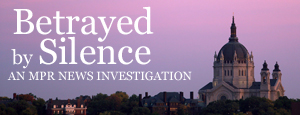
Explore the full investigation Clergy abuse, cover-up and crisis in the Twin Cities Catholic church
Upset that her superiors had refused to take action, a former church official reported to police that leaders of the Archdiocese of St. Paul and Minneapolis had kept secret for eight years images of pornography — some of it appearing to show children — belonging to one of its priests.
Jennifer Haselberger, the archdiocese's former chancellor for canonical affairs, tried to get Archbishop John Nienstedt's attention by using what she called the "nuclear option."
Haselberger went back to her office, copied several images into an electronic document and sent the document to Nienstedt. Some of the images from the archdiocese's files on the Rev. Jonathan Shelley, 52, appeared to show boys performing oral sex.
The archbishop never called police, she said. Months later, the Rev. Peter Laird, Nienstedt's deputy, ordered her to hand over the pornographic images.
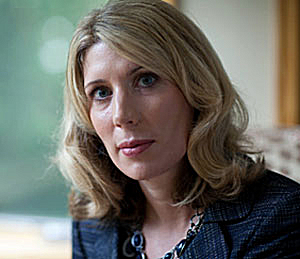
"I did as I was told," said Haselberger, who resigned in April. "I went back to my office. I closed the door and I called Ramsey County."
But officers with the St. Paul Police Department's sex crimes and vice units couldn't find the child pornography that Haselberger had reported, despite several reviews of the three disks of evidence the archdiocese had handed over. Police closed the case this week without charges.

The report from lead investigator Sgt. William Gillet cited insufficient evidence. In the report, Gillet wondered whether the archdiocese turned over all the evidence when he began investigating in March.
"It should be noted I do not have the computer as we were told that was destroyed many years ago," Gillet wrote. "Whether these discs given to me were the actual discs or copies of those discs after first asking for them, I do not know nor will I most likely ever know."
The Archdiocese of St. Paul and Minneapolis declined requests for interviews with senior leaders.
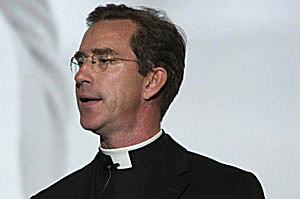
Laird, the vicar general, resigned Thursday, weeks after an MPR News investigation revealed that archdiocesan leaders hid sexual misconduct by the Rev. Curtis Wehmeyer and allowed him to continue in ministry. Wehmeyer was sent to prison this year for sexually abusing two children and possessing child pornography.
• MPR News: Laird, top deputy of archdiocese, resigns
Shelley's case surfaced Thursday during a contentious Ramsey County court hearing on whether to unseal a list of names of priests accused of sexual abuse.
The archdiocese stood by its handling of the Shelley matter as it tried to keep his name from the public record. The judge agreed to refer to the priest only as "JS" but his name was already public in a police file that had closed the day before.
Shelley, who lives in Minneapolis, said he didn't do anything illegal.
"There was no criminal stuff involved in it or wherever, and it was 10 years ago," Shelley told MPR News. "If you're going to take my name and drag it through the mud now, 10 years later, for something that you clearly don't know all the facts on, that's something you're free to do. But I'm not going to add to it."
Nienstedt placed Shelley on sabbatical in June of last year. He had been assigned to the Parish of St. John the Baptist in Hugo, Minn., since 2008.
"This was the computer from the parish priest"
Joe Ternus was the person who alerted church leaders to the pornography he found on Shelley's original computer.
Ternus wanted to use the priest's old computer so his kids could play video games. He couldn't believe the images he found.
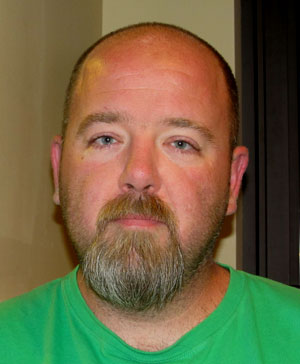
"It was graphic. It was hard-core," Ternus said of the images he found on the laptop. "Just kind of freaked out everybody. I mean, this was something that a bunch of 6-, 7- and 8-year-old kids were going to be using, and this was what was on there waiting for them, if somebody hadn't taken the time to go in and look for it. And apart from that, this was the computer from the parish priest where my family went."
Shelley at that point was assigned to St. Jude of the Lake parish in Mahtomedi, Minn.
Ternus reported his discovery to the Rev. Kevin McDonough, then-vicar general and second in command at the archdiocese. Ternus turned over the hard drive so the archdiocese could investigate.
McDonough, he said, gave him all manner of assurances when they met about the pornography in 2004. "This was going to be taken care of," Ternus said McDonough told him. "Jon Shelley was going to get appropriate counseling, or however it was that they put it at the time.
"And the thing we all wanted to make sure was this wasn't going to be treated like all of the things we'd seen in the news to that point, where people get picked up and moved around and things get swept under the rug."
This was two years after the clergy sex abuse scandal rocked the Roman Catholic Church. Dioceses around the country were putting child safety plans in place, after the U.S. Conference of Catholic Bishops developed new procedures to protect children from sexual abuse.
• U.S. Conference of Catholic Bishops: 2002 Charter for the Protection of Children and Young People
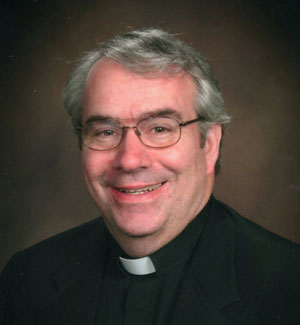
In 2012, Robert Finn of Kansas City became the first American bishop to be convicted of protecting an abusive priest. He failed to call police when he learned of child pornography on a priest's computer.
• The New York Times: Kansas City Bishop Convicted of Shielding Pedophile Priest
Haselberger said she brought up Finn as she warned top officials that the archdiocese could face a criminal investigation.
Federal law prohibits "possession of any image of child pornography." Minnesota state law requires priests to report to authorities any indication that a child has been sexually abused within the last three years. Withholding that information is illegal.
"Thousands of images"
When the archdiocese learned of the pornography on the computer in 2004, it asked Shelley to turn over all of his remaining computers for forensic analysis.
Shelley responded by destroying one of the computers with a hammer, Haselberger said.
"I recall he made some kind of argument about how he was worried about all of the confidential data about his parishioners that were on his computer," she said, citing records she had seen.
Then-Archbishop Harry Flynn sent Shelley to St. Luke Institute in Silver Spring, Md., a treatment center that specializes in clergy psychological and sexual issues, for evaluation. When Shelley returned, he was placed back in ministry.
Attempts to contact Flynn, who retired in 2008, were unsuccessful.
Archdiocese spokesman Jim Accurso told MPR News that Flynn did nothing wrong. "You've got hearsay from Jennifer," Accurso said. "You're talking about a retired bishop."
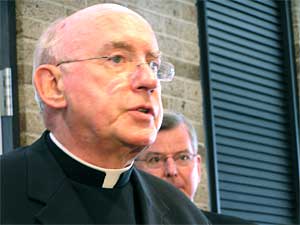
Richard Setter & Associates, a private investigation firm retained by the archdiocese, hired a forensic computer expert to look at some of the files on Shelley's old computer. The report made reference to "thousands of images," including some child pornography, St. Paul police Sgt. William Gillet wrote in his summary of the police investigation.
The Setter report used the phrase "borderline illegal" to describe some of the images of young men on the computer, said Haselberger, who saw it in Shelley's file.
The disks created by the archdiocese's investigation sat in the chancery — the archdiocese's main offices on Summit Avenue in St. Paul — for four more years. In 2008, they were moved to the basement.
Haselberger said the disks were stored with a warning.
"There was a handwritten note attached to those CD-ROMs in Father McDonough's handwriting, saying something to the effect of 'don't insert these disks into a computer that's attached to the Internet' and 'see previous report prior to viewing images,'" she said.
In 2011, Shelley was being considered for a new assignment, which prompted Haselberger to take a closer look at his personnel file.
• MPR News coverage: Archdiocese of St. Paul and Minneapolis
Haselberger said Shelley's file contained a complaint from a summer camp counselor from the mid-1990s about how Shelley, as a seminarian, wrestled with young boys and spent time in the cabins after dark. She also saw a report that an 18-year-old parishioner lived with Shelley in 2009, she said.
She read accounts of the Setter investigation of Shelley. Eventually, she decided to look at the images from the investigation that had been stored on disks.
Some of the images appeared to depict minors performing oral sex, she said, while others involved adults but were staged to look like the sex acts took place in schools.
Full coverage
Help us tell this story
Contact the reporter
The discovery led to her "go nuclear" moment and her eventual decision to call police.
Police asked church officials to turn over the evidence on March 5 of this year during a visit to the archdiocese's main offices in St. Paul. The response of Andrew Eisenzimmer, the now-retired archdiocesan legal counsel and chancellor for civil affairs, to that request caught investigator Gillet by surprise.
"Eisenzimmer was visibly upset" and asked for the name of the priest involved, Gillet wrote in his report. "Eisenzimmer went so far as to say that he needed to know which property we were talking about. We were surprised with this, as it suggested to us the possibility that there might be more than one case of pornographic materials the church was dealing with."
Gillet agreed to leave the archdiocese offices without the file containing the pornography and documents. He wrote in his report that he would call Eisenzimmer back with the priest's name, then collect the evidence.
But church officials did not provide Gillet with anything until two days later when Tom Wieser, a St. Paul lawyer, called to say the sergeant could collect three computer disks from his office.
Wieser declined to give Gillet the church's internal documents, "saying they were the product of their investigation," Gillet wrote in his report. "Such documents are not necessary at this time."
Police closed the investigation Wednesday. No one has been charged with any crime in connection to the case.
Editor's note (Oct. 4, 2013: 7:15 p.m.): This is an updated version of a story that was originally posted Oct. 4, 2013, at 4:15 a.m.
Sasha Aslanian, Meg Martin and Tom Scheck contributed to this report.



